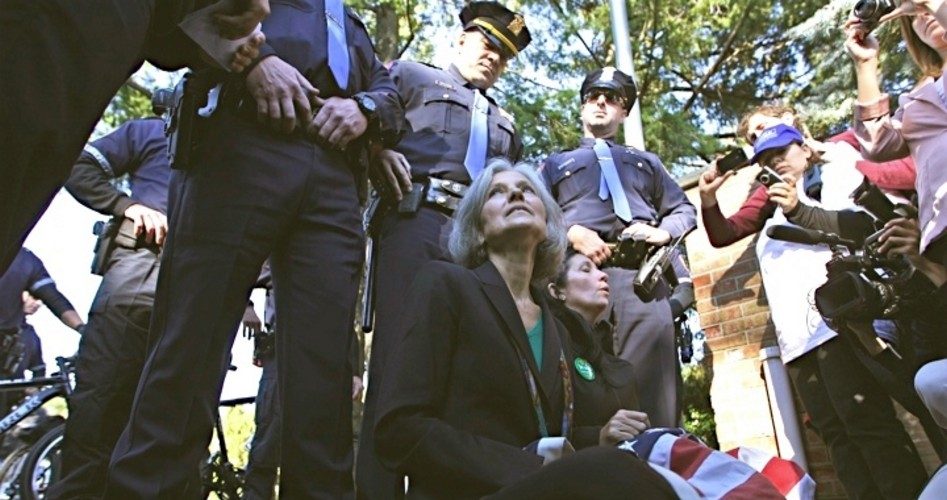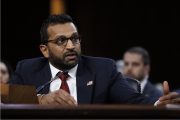
Jill Stein is the Green Party candidate for president, but she wasn’t invited to the debate last Tuesday night. In fact, when Stein and her running mate Cheri Honkala protested their exclusion from the official debate held at Hofstra University, they were hauled off to jail.
Joining a throng of supporters gathered outside the debate venue to protest the two-party hegemony of the presidential election process, Stein told the crowd, “We are here to bring the courage of those excluded from our politics to this mock debate, this mockery of democracy.”
The demonstration was part of a program promoted by the Green Party to “Occupy the Commission on Presidential Debates (CPD).” The CPD is a joint venture of the two major political parties, created in 1987 to establish the rules for the management of presidential debates.
According to the CPD website:
Those candidates qualify for debate participation who (1) are constitutionally eligible to hold the office of President of the United States; (2) have achieved ballot access in a sufficient number of states to win a theoretical Electoral College majority in the general election; and (3) have demonstrated a level of support of at least 15 percent of the national electorate, as determined by five selected national public opinion polling organizations, using the average of those organizations’ most recent publicly-reported results.
After addressing the rally, Stein and Honkala walked onto the area cordoned off as the official debate venue where they were “stopped by police officers.” In defiance, the Green Party ticket sat down and refused to leave the area.
Huffington Post reports that “Student-run news organization Long Island Report posted a video of Stein and Honkala sitting, with an officer arguing, ‘You’re blocking traffic.’”
After Honkala defended the pair’s actions on First Amendment grounds (the First Amendment protects the right to speak freely and to assemble) the video seems to show law enforcement lifting the women and removing them from the scene.
The campaign’s website reports that “Jill Stein and Cheri Honkala are now free from police custody after eight hours handcuffed to a metal chair in a remote police warehouse on Long Island.” The pair reportedly left the jail at about 10:30 p.m.
Upon being released from police custody, Stein, a physician, stated, “It was painful but symbolic to be handcuffed for all those hours, because that [is] what the Commission on Presidential Debates has essentially done to American democracy.”
For her part, Honkala described her time in jail as “extremely uncomfortable, but standard for what so many Americans face on a daily basis in our corrections system.”
Stein Campaign Manager Ben Manski added, “These arrests and this treatment are outrageous and disproportionate; who do the police think they are protecting here?”
Not that her incarceration came as a complete surprise, though. In an interview with Philadelphia Weekly published prior to her demonstration outside the second officially sanctioned presidential debate, Stein was resolute, saying, “We are prepared to be arrested in the service of democracy and a future that serves us all.”
Although there is much in the Green Party’s platform that promotes programs and policies not authorized by the Constitution, the exclusion of dissenting voices from the public forum is itself contrary to the American way and the spirit of republican government.
Also, even though Stein and Honkala were arrested by local law enforcement, there is something about the events that led to their incarceration that reminds one of the climate created by the enactment of H.R. 347, the Federal Restricted Buildings and Grounds Improvement Act of 2011.
Without fanfare, on March 8, 2012, President Barack Obama signed H.R. 347 into law.
Most media coverage of this bill paints it as a beefed-up effort to protect the president and other top-ranking government officials from assassination attempts and other threats of violence.
Despite this soft-pedaling, there is much more to this law than mainstream media reports would indicate.
For example, in one section of this new legislation, individuals are expressly forbidden under penalty of law from trespassing onto the grounds of the White House. Of course, such an encroachment was already illegal, so why the new provision?
There is already a D.C. ordinance that prosecutes White House trespassers. Violation of this provision of the city code was a misdemeanor.
The penalties for such trespass are much more severe, now, however. Under H.R. 347, Congress may at its discretion impose federal criminal charges on not only those who enter the White House grounds without prior permission, but on anyone who participates in protests at or near a location falling within the greatly enlarged scope of this new prohibited zone.
In addition to the increased legal ramifications for trespassing on White House grounds, the penalty for protesting within the shifting high security zone is enough to give pause to those contemplating participation in a protest against a government official or policy.
One example of how H.R. 347 imposes an unconstitutional prior restraint on political speech and assembly is found in Section (c) of the act. This paragraph defines the key phrase “restricted buildings” as follows:
“Restricted buildings or grounds” means any posted, cordoned off, or otherwise restricted area —
(A) of the White House or its grounds, or the Vice President’s official residence or its grounds;
(B) of a building or grounds where the President or other person protected by the Secret Service is or will be temporarily visiting; or
(C) of a building or grounds so restricted in conjunction with an event designated as a special event of national significance
Under the terms of the existing law amended by this act, the Department of Homeland Security is tasked with deciding which events will qualify as being of “national significance.”
In addition to control over the fluid and fickle designation of “restricted buildings” afforded to the Congress, the bill endows the president with the power to extend Secret Service protection to anyone he deems worthy. The president accomplishes such an act by way of issuing a memo.
Section (c) explains:
The term “other person protected by the Secret Service” means any person whom the United States Secret Service is authorized to protect under section 3056 of this title or by Presidential memorandum, when such person has not declined such protection….
These two subsections make it a federal crime punishable by up to 10 years in prison to “enter or remain” in any designated area without permission, and, that forbidden zone may shift from here to there without prior notice depending on the presence of any person the president has placed under the protection of the Secret Service.
Notably, the bill does not require “willful” encroachment into a restricted area, the requisite mental state for committing this new crime is merely the “knowing” encroachment into a restricted area. It is in this nuance that the government lays one of its most well-camouflaged snares.
The distinction between “willful” and “knowing” is a legal construction that needn’t be explained fully here, but for purposes of understanding the implications of the difference on a person’s First Amendment rights of free speech, one need only understand that a protestor would certainly “know” that he is protesting, where he is protesting, and that his protest is an expression of opposition to a person or a policy.
Also, given the fact that the designation of a restricted zone changes without notice (no special police tape, no signs, no noticeable law enforcement patrolling the area), a protestor would probably not know that he was trespassing into a specially protected “restricted zone” or that he was too close to a person endowed by the president with a Secret Service retinue.
It is possible, therefore, that anyone — even a candidate for president — could approach the site of a debate and find himself within the prohibited parameters and be subject to federal fines and imprisonment.
Again, Stein was not arrested under the provisions of H.R. 347, but her description of the situation is correct and such restrictions represent a real threat to the freedoms of association and speech.
The climate created by H.R. 347 is inhospitable to protest and demonstration and is the very definition of the “chilling effect” on free speech that should concern all citizens, regardless of party affiliation.
Her previous arrest notwithstanding, Stein should be safe attending a presidential debate October 18. Stein and Libertarian Party presidential candidate Gary Johnson will square off in an online debate at 7 p.m. EST sponsored by the U.S. Independent Voter Network.
Photo: Green Party presidential candidate Jill Stein, left, and vice presidential candidate Cheri Honkala sit at the entrance to Hofstra University, Hempstead, N.Y., Oct. 16, 2012: AP Images


